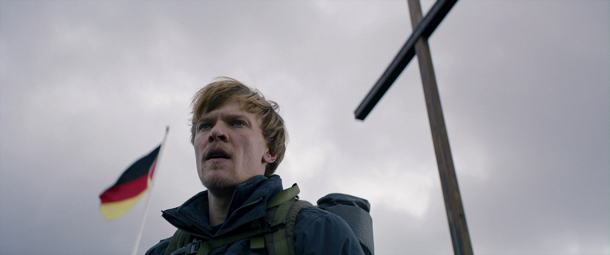
Dir.: Azli Özge; Cast: Sebastian Hülk, Julia Jentsch, Hanns Zischler, Sascha A. Gersak, Luise Heyer; Germany/Netherlands 2016, 112 min.
German/Turkish filmmaker Asli Özge (Lifelong) has developed a well-constructed narrative about young bourgeois Germans, who seem on the outside to be unlike their infamous Nazi grandparents, but, as it turns out, have more in common than first appears.
Karsten (Hülk), in his mid-twenties, works in a bank and has steady relationship with Laura (Jentsch). When she is away on a business Karsten decides to give a party, and soon finds himself alone with Anna, celebrating her birthday with some flirtatious fun. One thing leads to another and suddenly we see Karsten running to a nearby hospital, which is closed. He returns, and eventually phones an ambulance – but it’s too late, Anna is dead. It transpires the young woman was German, but lived in Russia for a while where she was married with a daughter. Questioned by police, Karsten has no answer as to why he he didn’t phone for an ambulance immediately. And to make matters worse, he has hidden Anna’s underclothing, which Laura finds on her return. The autopsy result shows that Anna took medication for asthma; the alcohol she consumed was contraindicative, and led to a cardiac arrhythmia. She more or less suffocated. At home with his parents, Karsten compares himself to his racist father Klaus (Zischler), who has offered the Russian family a financial settlement, which they have refused. “I am like you”, Karsten exclaims, “ I just want to look superior”. Nevertheless, he soon changes his mind, and visits Andrej (Gersark), Anna’s husband, but manages to upset him too with some high-handed behaviour. Later he is cleared in court, and starts to take revenge on his superiors at the bank (who had demoted him during the case) and on his former girlfriend Judith (Heyer), whom he now blames for his relationship breakdown with Laura.
Unfortunately, All of a Sudden runs into difficulties early on: Özge aims for enigma but her direction is often clumsy and overlaboured: images and words overlapping, stretching the threadbare chronicle to the maximum. Despite a competent performance, Hülk is never able to show the slightest menace, leaving us in doubt about his involvement with Anna and what emerges at the end is rhetorical rather than meaningful. Emre Erkmen’s superb camerawork supports the rather limp realism, but makes evocative use the small Rhineland town of Altena with memorable results. AS.
SCREENING DURING BFI LONDON FILM FESTIVAL 5-16 OCTOBER 2016